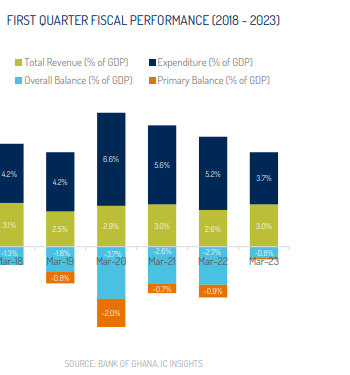
Audio By Carbonatix
A lower-than-targeted primary deficit indicates that Ghana’s fiscal adjustment is underway, IC Research, the analytical arm of IC Securities has stated.
The country recorded a primary deficit of ¢596 million (0.1% of Gross Domestic Product) in the first quarter of 2023, against the target deficit of ¢4.6 billion (0.6 percent of GDP).
According to IC Research, fiscal adjustment is underway, with the help of expenditure containment.
The revenue and expenditure dynamics revealed that the fiscal adjustment in quarter one of 2023 was largely driven by expenditure controls instead of the revenue-based consolidation envisaged in the 2023 budget.
The Treasury’s budget execution for the first 3- months of 2023 showed a lower overall fiscal deficit of ¢6.7 billion (0.8% of GDP) against a target of 2.3% in quarter 1, 2023.
Total revenue and grants in the first quarter of 2023 turned out at ¢26.0 billion (3.3% of GDP), falling short of the target by 0.9% of GDP. Total expenditure amounted to ¢32.7 billion (4.1% of GDP), sufficiently below the target of ¢52.1 billion and supported the faster-than-expected compression in the budget deficit.
“Specifically, we observed a year-on-year fiscal adjustment equivalent to 0.8% of GDP as the primary deficit narrowed to 0.1% of GDP in quarter 1, 2023 compared to the target of -0.6% and outturn of -0.9% in quarter 1, 2022”, IC Securities explained.
Furthermore, it said “We attribute the ¢19.4 billion (2.3% of GDP) spending suppression to the impact of the Domestic Debt Exchange (DDE) and the suspension of external debt service”.

Falling revenue attributed to tax administration challenges
On falling revenue, IC Research attributed it to lingering challenges with tax administration and compliance as well as the softening of economic activity.
“We also believe the adverse impact of the DDE on banks’ financial results exerted a negative spillover to tax obligations toward the Treasury. In our view, the weakening economic activity and the medium-term impact of the DDE on banks’ financial position will pose a downside risk to the Treasury’s plan for a revenue-based fiscal adjustment”, it added.
Latest Stories
-
KAAF University donates to Widows, urges Public to end Discrimination against Elderly Widows
6 minutes -
NAIMOS task force disrupts illegal mining operations along Ankobra River
16 minutes -
President’s New Year message lacked hope and sincerity – NPP’s Senyo Amekplenu
50 minutes -
Ebo Noah remanded pending psychiatric exam, to reappear on January 15
1 hour -
Our public university system is falling down
1 hour -
Ho Central Mosque under heavy security, worshippers forced to pray outdoors
2 hours -
An open letter to H.E. John Dramani Mahama: The audacity of the third shift
2 hours -
A new era of healthcare dawns in Kintampo: Mary Queen of Love Medical Hospital opens its doors
3 hours -
NDC gov’t has demonstrated strong fiscal discipline – Abdulai Alhassan
3 hours -
Heavily armed Burkinabè soldiers arrested in Ghana
3 hours -
Tamale Chief commends IGP Special Operations Team for crime reduction efforts
4 hours -
None of NPP’s 5 flagbearer aspirants is credible – Abdulai Alhassan
4 hours -
Police arrest suspect for unlawful possession and attempted sale of firearm
5 hours -
3 arrested in connection with Tema robberies
5 hours -
Your mouth on weed is nothing to smile about
5 hours

